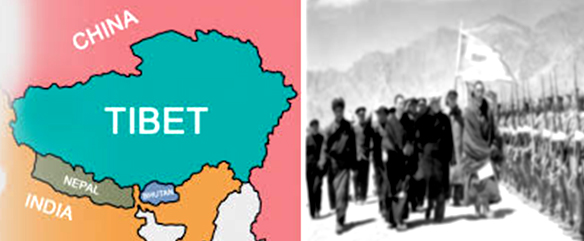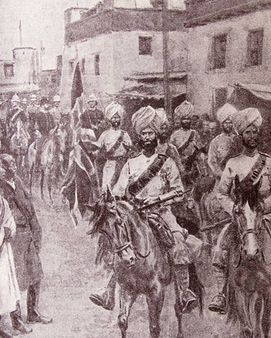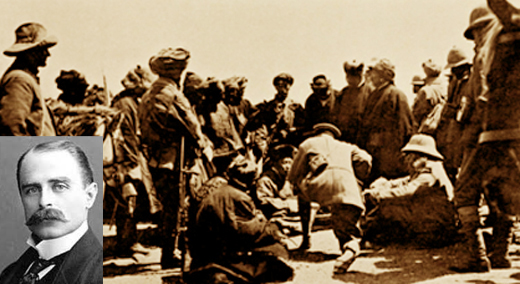THE ANGRY HIMALAYAS - String of pearls vs Garland of Opium
THE ANGRY HIMALAYAS - String of pearls vs Garland of Opium
Mangalore Today News Network
By Dr. G. Shreekumar Menon
Mangaluru, June 30, 2020: The Himalayas are reverberating with the crackle of boots as India and China array an Armageddon of military might that spans across 4056 kilometres, poised to strike at each other. The supremely confident Chinese have silently stretched over the last decade a String of Pearls, a network of military and commercial facilities developed by them in countries falling on the Indian Ocean between the Chinese mainland and Port Sudan.It is a strategic encirclement of India, a carefully crafted designing that has been going on for the past several years.
Ever since the Chinese forcibly occupied Tibet in 1950 and enslaved the Tibetans, they have aggressively pursued a policy of claiming large chunks of Indian territory under the garb that it is disputed.

After the occupation of Tibet, wars erupted between India and China in 1962, conflict in Nathu La the Tulung La ambush in 1967, 2017 Doklam Plateau standoff, and the latest 2020 Ladakh confrontation.
There is an air of trepidation around the world, two nuclear forces in confrontation mode, a belligerent China intimidating a resurgent India under the dynamic tutelage of Shri. Narendra Modi. The pusillanimity of the Nehruvian era stands replaced by a dynamic urge to repulse, to compel cooperation and readiness to match Chinese bellicosity. In the passage of time India has forgotten its past, generations of Indians have grown up with scant knowledge about how in the past Indian forces had humbled and humiliated the Chinese. We never teach about the Opium Wars in our History classes, consequently we are apprehensive about the Chinese.
In the passage of time India has forgotten its past, generations of Indians have grown up with scant knowledge about how in the past Indian forces had humbled and humiliated the Chinese. We never teach about the Opium Wars in our History classes, consequently we are apprehensive about the Chinese.
The first Governor General of India, Warren Hastings, unleashed the Opium devil on China. Traders were roped in to drown China in Opium, Jardine and Matheson joined with the Jewish Sassoon and Parsee smugglers in the vanguard of this trade assault, which later culminated in the First Opium War fought between 1839 to 1842. By 1840 it is estimated that there were 10 million Opium addicts in China. The Opium addicted Chinese were no match for the military contingent under Lieutenant-General Sir Hugh Gough, capturing Canton on 27 May 1841.
Who were the troops that Sir Hugh Gough was leading? Every Indian will be proud to learn that the British Army comprised of:
1Company Madras Rifles
2nd Madras Native Infantry
6th Madras Native Infantry
14th Madras Native Infantry
The Bengal Army
The Unit of the Madras Foot Artillery was awarded the honour title ‘Dragon Troop’, as this Unit captured a Chinese Dragon cannon.
The Chinese were defeated thoroughly and were forced to conclude treaties with the British. If we read History correctly, it is Indian troops who defeated the Chinese. Madrasis, Punjabis and Bengalis who jointly defeated the Opium addicted Chinese army.
However, another conflict erupted in 1860 and the Second Opium War began. In this Second Opium war in 1860, four brigades of Indian Infantry
•Sikh Regiment
•Madras Regiment
•Bombay Native Infantry
•The Ludhiana Rifles
took part in the sacking of the Summer Palace Yuanmingyuan, the imperial summer palace of the Qing Dynasty. This summer palace was razed to the ground by British and Indian forces.

The Opium Wars finally caused the overthrow of the Chinese Qing dynasty and the credit for this should go the Indian Army contingents that participated in the Opium Wars that left China devastated and humiliated.
The British expedition to Tibet, also known as the British invasion of Tibet or the FrancisYounghusband expedition to Tibet began in December 1903 and lasted until September 1904. Lord Curzon, viceroy of India, authorized Younghusband to cross the Tibetan border accompanied by a military escort to negotiate trade and frontier issues (July 1903). When efforts to begin negotiations failed, the British under the command of Major General James Macdonald invaded the country and slaughtered some 600 Tibetans at Guru. Colonel Younghusband moved on to Jiangzi (Gyantze), where his second attempt to begin trade negotiations also failed. He then marched into Lhasa, the capital, with British troops and forced the conclusion of a trade treaty with the Dalai Lama, Tibet’s ruler. This action brought him a knighthood in 1904. Younghusband’s army comprised of Sikh Pioneers, Gurkhas and Indian Army engineers.

Francis Younghusband and indian soldiers in Lhasa
India has every reason to be proud of its armed forces, if foreigners could motivate us and vanquish the Chinese, it can again be repeated. What we lack is our inability to teach our glorious History to our young generations. George Santayana the Spanish-American philosopher had opined “Those who do not learn History are doomed to repeat it.” Either we do not teach History or if at all we teach, it is misinterpreted and taught. History is now being doctored by movie scriptwriters in which invaders and marauders are glorified and the local war heroes are sidelined. This trend needs to be reversed or else coming generations will develop a disconnect with our past.
Coming to the present, the Chinese fear of Opium needs to be rekindled. If they threaten us with a string of pearls, we need to threaten them with their ancient enemy- Opium. The Chinese are taught History, their students are taught that the period in History between 1839 to 1949 is the Century of Humiliation, also known as the Hundred years of Humiliation.
Losing defeats to foreign powers cited as part of the Century of Humiliation include:
•Defeat in the First Opium War (1839–1842) by the British-Indian forces
•The unequal treaties (in particular Nanking, Whampoa, Aigun and Shimonoseki)
•Defeat in the Second Opium War (1856–1860) and the sacking of the Old Summer Palace by British, Indian and French forces.
•The Sino-French War (1884–1885)
•Defeat in the First Sino-Japanese War (1894–1895) by Japan
•The Eight-Nation Alliance suppressing the Boxer uprising (1899–1901)
•British-Indian expedition to Tibet (1903–1904)
•The Twenty-One Demands (1915) by Japan
•Japanese invasion of Manchuria (1931-1932)
•The Second Sino-Japanese War (1937–1945)
India needs to rekindle the memories of the Opium Wars in the Chinese. Our enforcement agencies are constantly seizing and destroying Opium and other Psychotropic Substances. It would be better if these are conserved and kept ready for air dropping on China in the event of a war. The Chinese proclivity for Opium should once again be their Achilles Heel. Let us get ready for Opium War III. If they are flaunting their String of Pearls, let us show them our Garland of Opium.
 Dr. G. Shreekumar Menon IRS (Rtd) Ph.D: Former Director General of National Academy of Customs Indirect Taxes and Narcotics & Multi-Disciplinary School Of Economic Intelligence India; Fellow, James Martin Centre For Non Proliferation Studies, USA; Fellow, Centre for International Trade & Security, University of Georgia, USA; Public Administration, Maxwell School of Public Administration, Syracuse University, U.S.A.; AOTS Scholar, Japan
Dr. G. Shreekumar Menon IRS (Rtd) Ph.D: Former Director General of National Academy of Customs Indirect Taxes and Narcotics & Multi-Disciplinary School Of Economic Intelligence India; Fellow, James Martin Centre For Non Proliferation Studies, USA; Fellow, Centre for International Trade & Security, University of Georgia, USA; Public Administration, Maxwell School of Public Administration, Syracuse University, U.S.A.; AOTS Scholar, Japan
- The Poor cry out to Us: Do we respond?
- Clandestine Meth Labs Sprouting Across India
- Hydro ganja from Bangkok latest craze among youth in India
- "Memories to Treasure" Dr.Michael Lobo’s new book
- Dominance of Private Universities: Will it make education inaccessible to underprivileged students?
- Monti Phest: A rich heritage of South Canara
- When jails become drug dens
- Where to go at night in Istanbul and what to expect
- TODAY, is WORSE than the ‘EMERGENCY!’
- Drug abuse among school children
- Sathya Sai Grama: An inspiring place to learn and admire India’s secular culture
- Rave parties - It’s just drugs, alcohol and sex
- Sponsored ruckus on American University Campuses
- Kashmir Bhavan in Bengaluru: A must visit place
- "MAI and I" Book of Angelic Emotions
- Draupadi Murmu - The New ’President of India’
- Anthony Ashram in the city grows a classic museum
- First College of Fisheries in India - A Golden Jubilarian
- Flushing Meadows - A Vintage Mansion
- The Colonel�s Bequest
- A Mangalorean PM and his RBI Governor Brother: The Extraordinary story of the Benegal Brothers
- There is no higher religion than Truth: Theosophical Society
- L�affaire - Ashu & Yiju of Mangalore
- Mangalore in Kowloon
- 1568 to 2018 AD: 450 years of Christianity in Mangaluru
- Vice President elect Naidu moves on from nadir to zenith, the phenomenal journey
- Embracing the Outdoors: How Heated Jackets Are Revolutionizing Cold Weather Activities
- Efficient and Sustainable Packaging Solutions with FIBCs
- The Hybrid Kilt Revolution | Where Tradition Gets Trendy
- Affordable Elegance | Embrace Style on a Budget with Cheap Kilts
- Unleashing Style and Functionality | Exploring Tactical Kilts
- Mangalore’s Heroic Lady marks 105th Birthday
- Santa the Christmas spirit
- Geriatric care: Mangalore strikes a fine balance
- The Don Who Made Two Empires to Clash
- CHITRAPUR SARASWATS - A Great Kanara Community
- Our new President Ram Nath Kovind’s significant journey to Rashtrapathi Bhavan
- Marriages made in heaven, big fat weddings made in India
- Eid insight - The giver of glad tidings
- CITY INFORMATION
- TRAVEL
- TOURIST INFORMATION
- HEALTH CARE
- MISCELLANEOUS




 Write Comment
Write Comment E-Mail To a Friend
E-Mail To a Friend Facebook
Facebook Twitter
Twitter  Print
Print 


